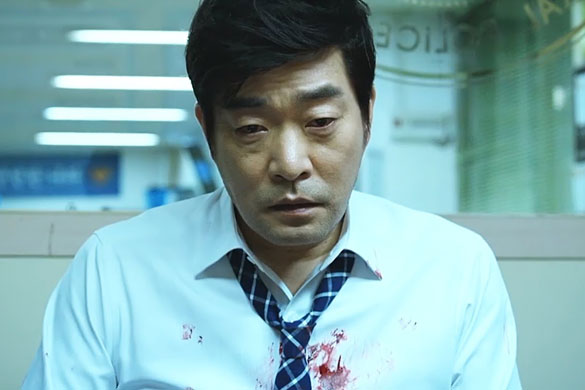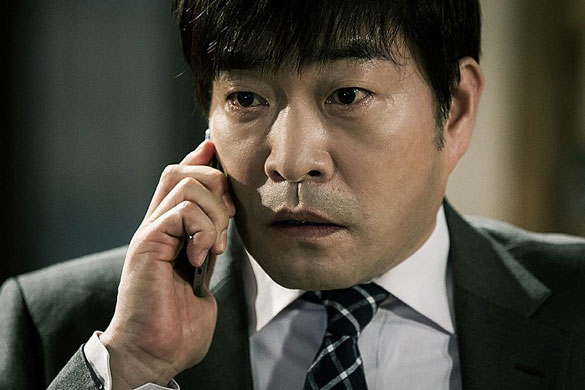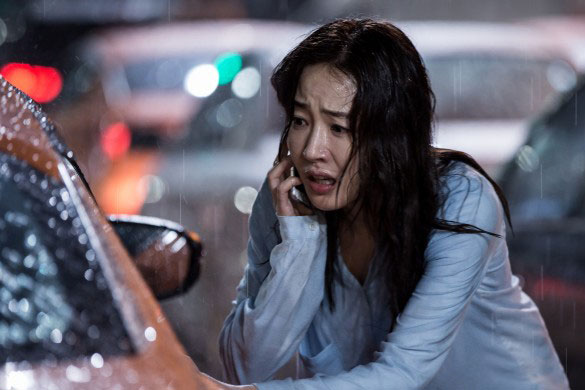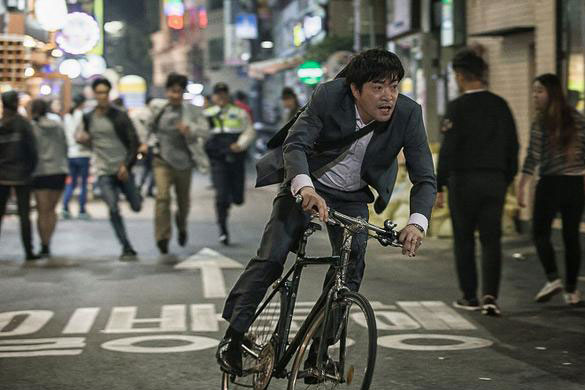
 |
||||
Dong-ho (Son Hyun-joo) is a lawyer whose high profile cases have greatly angered a number of powerful individuals to the extent that he and his wife, Yeon-soo (Uhm Ji-won), are increasingly receiving anonymous, handwritten death threats at their home. However, his dismissive attitude to the perhaps all too real danger inherent to such intimidating messages soon proves to be a devastating miscalculation for on returning home drunk on a night a solar flare is disabling electronic communications throughout Seoul he finds Yeon-soo's battered and lifeless body sprawled on the lounge floor.
Review: From right back in the New Korean Cinema wave of the late 90s and early 2000s to the present day there has been a fairly regular trend for Korean film narratives through various genres to centre on characters facing a seemingly insurmountable separation who are able to somehow connect through some otherworldly means, whether that separation is time in classics such as Il Mare, Ditto and more recently Will You be There etc; death (or near death) itself – Ghost in Love, The Gingko Bed, Miss the Train, Be With You, One Day (trust me, the list goes on almost ad infinitum); or indeed both death and time – again Il Mare, Will You be There, Be With You etc etc and indeed our current case in point The Phone, the connection often in the process allowing protagonists to at least attempt to change or undo past tragedies.
In early conversations between 2015’s Dong-ho and 2014’s Yeon-soo information he gives her causes her to change her choice of actions from those she made in the timeline where they didn’t interact (even though she’s unaware of that – from her point of view this is the first time she’s done any of this), thereby altering the past and consequently changing the present, though not in a positive sense and certainly not in the way Dong-ho in 2015 expects. This is deftly and memorably shown by back and forth scene juxtaposition between then and now, Yeon-soo's differing choices manifesting in real time for Dong-ho (for example, as she crashes into and breaks both a shelving unit and the ornaments it holds in 2014 each consecutively disappears before Dong-ho’s 2015 eyes, etc).
Time related and indeed time dependent stories are frankly a minefield for such possible inconsistencies and, for me at least, they virtually force me to try and rationalise them at length, instantly pulling away from narrative immersion and if I do come to the sad realisation that rationalisation isn’t ultimately possible I simply lose faith, fearing that a specific end point and the supposed ingenious nature of the otherworldly interactions were all the director really cared about and even, perhaps, how he got there he figured he’d ‘get away with’. There is a reason why Il Mare and Ditto are considered classics of Korean cinema ‘love across time’ tales and why films like Be With You and One Day were so well received on release. That is not least that they each take the tiniest of time related story nuances and go to the proper lengths to ensure there is reason behind and validation for every single one. The Phone is fairly well paced, brisk but never rushed, and the narrative is engaging enough for the most part. Action sequences, too, certainly have their moments and especially in the visceral mano-a-mano battle between innocent and guilty in both past and present could even be said to be exciting (though a high speed chase with Dong-ho on a bicycle does border on the ludicrous). However, there is ultimately nothing in The Phone that Korean cinema fans won’t have seen before and because the love across time elements aren’t particularly original the film rather comes across as derivative more than anything else. Director Kim Bong-joo does succeed to a degree in bringing a certain amount of unpredictability to proceedings – mostly in the second timeline – but even that is overshadowed by the fact that the vast majority of viewers will see the story’s ultimate destination not only far in advance of it transpiring but also from the film’s very early stages. As such, virtually the entire narrative brings with it a feeling of going through the motions to get to a specific conclusion we already know is coming.
THE PHONE (더폰) / 2015
|
||||
All images © Next Entertainment World Review © Paul Quinn |
||||



